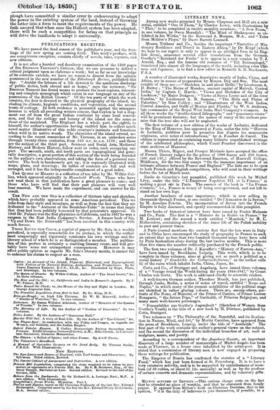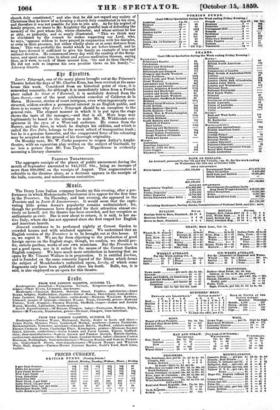LITERARY NEWS.
Among new works promised by Messrs. Chapman and Hall are a new serial, entitled " One of Them," by Charles Lever, with illustrations hi " Phis," to be completed in twelve monthly numbers ; " A New Poem," in one volume, by Owen Meredith ; " The Mind of Shakespeare as ex- hibited in his Works," by the Reverend A. Morgan, M.A., and " Tales from Moliere's Plays," by Deere Barrett Lennard.
Messrs. Triibner and Co., besides the important "Narrative of Mis- sionary Residence and Travel in Eastern Africa," by Dr. Kmpf (which we hear to our regret is only to appear in an abridged form in its Eng- lish dress), announce several other translations from the German. Goethe's "Reinhard der Fuchs " is to appear in a new version by T. I. Arnold, Esq. ; and the famous old romance of " Till Eulenspiegel," translated into almost all the languages of the world, including even Chi- nese and Japanese, is to find a new editor in Kenneth R. II. Mackenzie, F. S.A.
A number of illustrated works, descriptive mostly of India, China, and Africa, are in course of preparation by Messrs. Day and Son. The most notable of these are --" Sketches in and about Delhi," by Lieutenant A. D. Butter ; " The Ruins of Mandoo, ancient capital of Malvah, Central India," by Captain C. Harris ; " Views and Sketches of the City of Lucknow, by Major Dodgson ; "Views of Sierra Leone and of the river Gambia," by Lieutenant A. M. Samson ; "The Hills and Plains of
Palestine," by Miss Cubley, ; and "Illustrations of the West Indies, Central America, and Gulfs of Mexico and Florida," by W. S. Andrews, late commander of the Royal West India Mail Company's steamers. In all these works the "double-tinted lithographs" and "panoramic views" will be prominent features ; but the names of many of the authors pro- mise that the text also will not be neglected.
The first volume of a new edition of the works of Leibnitz, dedicated to the King of Hanover, has appeared at Paris, under the title " fEuvres de Leibnitz, publiees pour la premiere fois d'apres lea mrumscrits originaux, avec notes et introductions," by A. Poacher de CareiL The edition is represented as containing many hitherto unpublished writings of the celebrated philosopher, which Count Foucher discovered in tlin state archives of Hanover.
Messrs. Thiers, Mignet, and Prosper Merimee have accepted the office of French literary judges for the prizes of 1000 francs and 250 francs, (40/. and 101.0 offered by the Reverend Emerton, of Hanwell College, Middlesex, for the two best essays "On the immense importance of an intimate alliance between France and England." The lists are to be open to both French and English competitors, who will send in their writings 'before the let of March.next.
Emile de Girardin's last pamphlet; published this week by _Michef Levy, under the title " L'Empereur Napoleon III. et la France," is making a great stir in Paris. The essence of the book is "La France s'ennuie," i.e., France is weary of being over-governed, and not left to . stand on her own legs.
Another brochure of some importance, which is now selling in thousands through France, is one entitled "De r Annexion de is Savoie," by M. Anselme Petetin. The incorporation of Savoy into the French, Empire is fully discussed, and openly recommended in this pamphlet.
Two books of historical interest have been issued by Poulet Malassis and Co., Paris. The first is a " Hiatoire de is Satire en France," by M. Lenient ; and the second a work entitled "3foschek," by M. L. Hollaenders, containing sketches of the inner life of the Polish nobility in past and present times.
A Paris journal mentions the curious fact that the late wars in Italy and in China have encouraged the study of geography in France to such an extent that no less than two hundred thousand maps have been sold by Paris booksellers alone during the last twelve months. This is more than five times the number ordinarily purchased by the French public.
The first two volumes of Dr. J. Kaeuffer's "History of Eastern-Asia," have been issued by Brockhaus, Leipzig. This work, which is to be complete in three volumes, aims at giving not so much a political as a social history (" Gesehiate tier Culturverhaltniese,!' as the author calls. it) of the races which inhabit India, China, Japan, &c.
Cotta and Co., of Stuttgart and Augsburg, have issued three volume's. of a "Voyage round the World during the years 1844-1847," by Count Charles von Gortz. The work is addressed chiefly to scientific readers.
A well-known. German author, Theodore Mundt, has just published, through Janke, Berlin, a series of notes of travel, entitled "Rome and Naples," in which many of the present notabilities of the political stage are sketched in rather glaring colours. There are, among others, por- traits of Pio Norio, of Mazzim, of the Prince of Canino, of Prince Lucien Bonaparte, "the future Pope," of Garibaldi, of Princess Belgiojoso, and many more well-known personages.
" Fmuenhilder aus Goethe's Jugendzeit" (Sketches of Women from Goethe's Youth) is the title of a new book by H. Diintzer, published by Cotta, Stuttgart.
Two volumes on "The Philosophy of the Beautiful, and its Realiza- tion in Nature, Mind, and Art," by Moritz Carriere, have appeared from the press of Brookhaus, Leipzig, under the title of " lestlietik." The first part of the work contains the author's general views on the subject, and the second the discussion of the individual branches of art, such as sculpture, music, and poetry.
According to a correspondent of the Augsburg Gazette, an important discovery of a large number of manuscripts of Michel Angelo has been, made at Florence, in a house once inhabited by the artist-poet. It its stated that a commission of literary men is now engaged in preparing these writings for publication.
The Emperor of Russia has confirmed the statutes of a "Literary Fund.," which has just been formed at St. Petersburg. It is to have a very extensive activity, and is to be supported by contributions of mem- bers (of 10 rubles, or about 11. 128. annually) as well as by- the produce of certain concerts and dramatic representations, and by voluntary gifts.
Arrrros ACCUSED OF LIPIETY.—This curious charge rests on the fact that ho attended no place of worship, and that. he abstained from family prayer. It appears from Milton's work on Christian Doctrine, that in Ins opinion "it is the duty of believers to join themselves, if possible, to a church duly constituted," and also that he did not regard any society of Christians that he knew of as forming a church duly constituted in his eyes, and therefore it was not possible for him to join any. As for his neglect of family prayers, we leave to Mr. Keightley the grateful task of defending the memory of the poet whose life, whose character, and whose actions he has so ably, so patiently, and so amply illustrated. "This we think may be elucidated by the remark he makes respecting our Lord, who, he says, appears seldom to have prayed in conjunction with his disciples, or even in their presence, but either wholly alone or at some distance from them.' This was probably the model which he set before himself, and he may have deemed it sufficient to give his family an example of true and rational devotion. He commenced every day with the reading of the Scrip- tures, and spent some time in silent and serious meditation thereon, saying thus, as it were, to each of those around him, 'Go and do thou likewise? He did not seek to impress his own peculiar views on his family."- Literary Gazette.



























 Previous page
Previous page